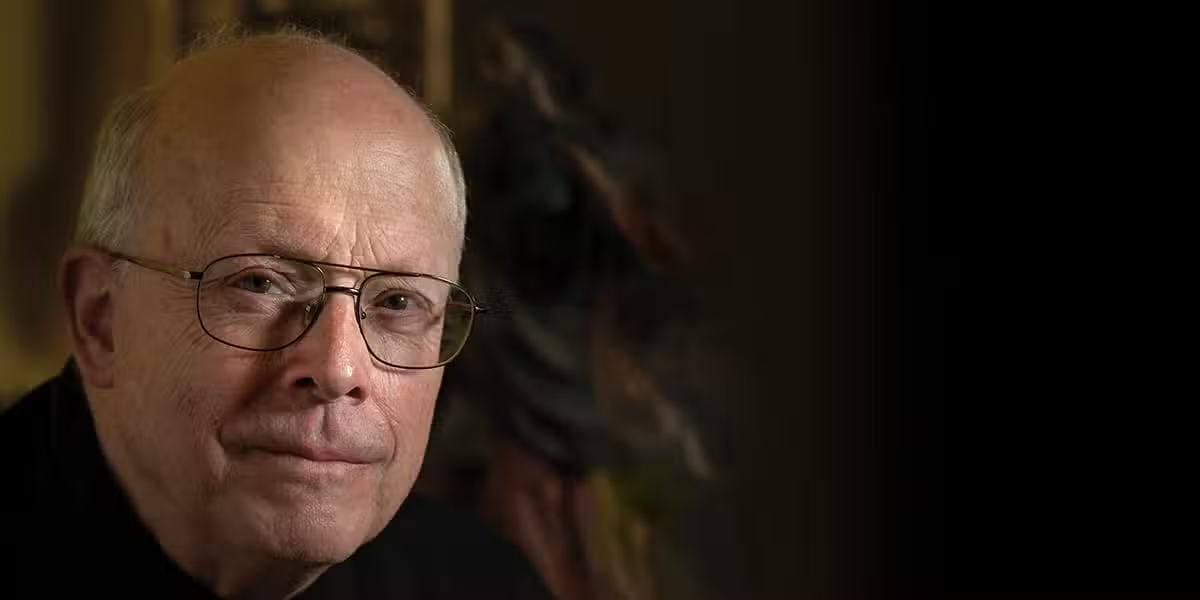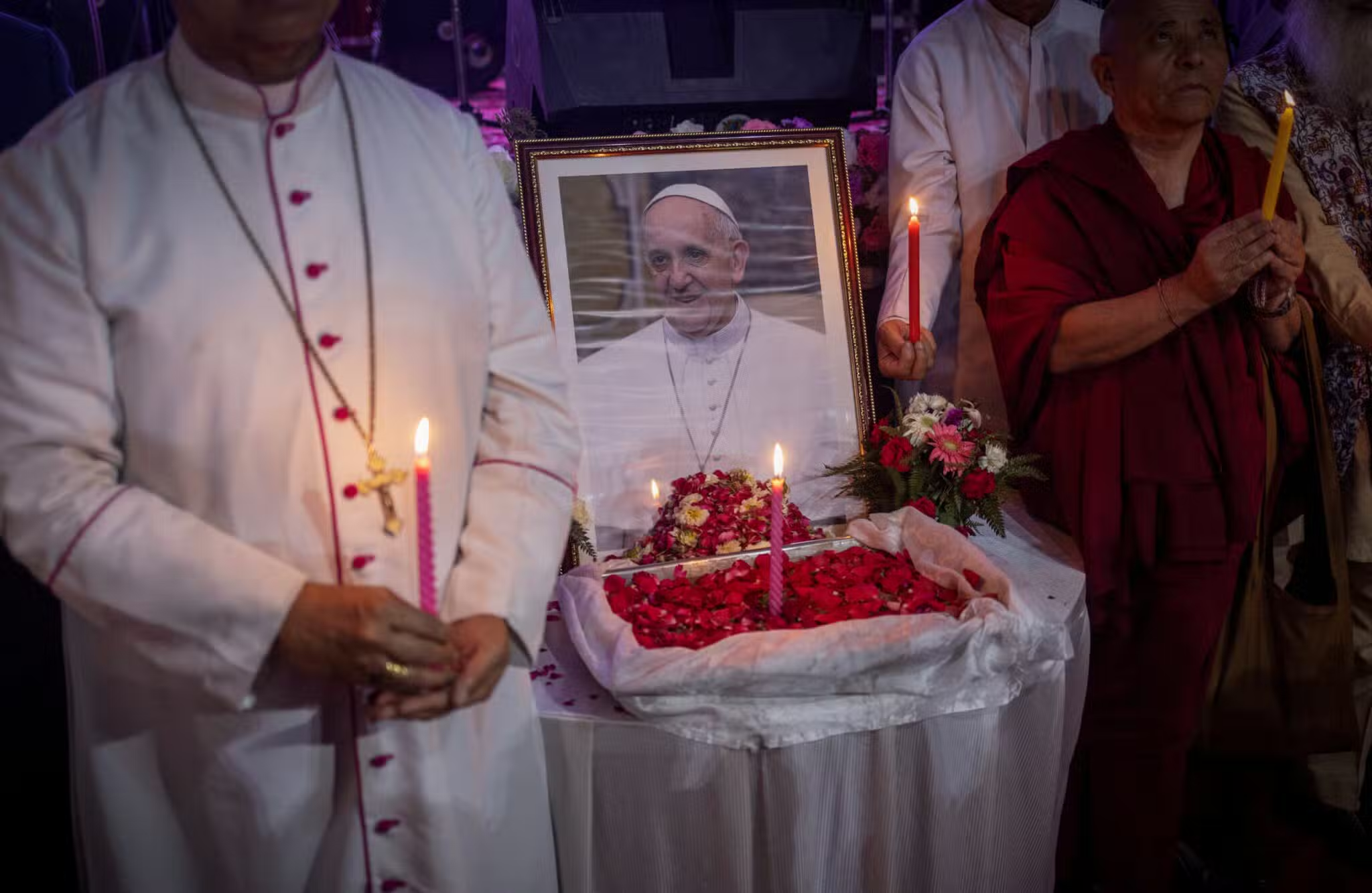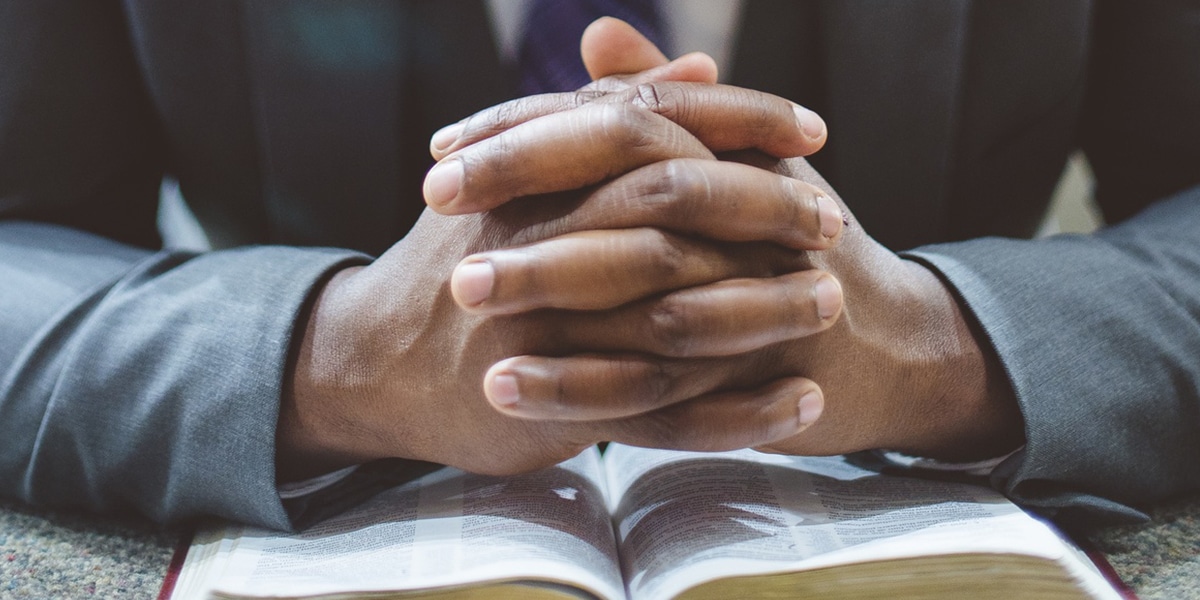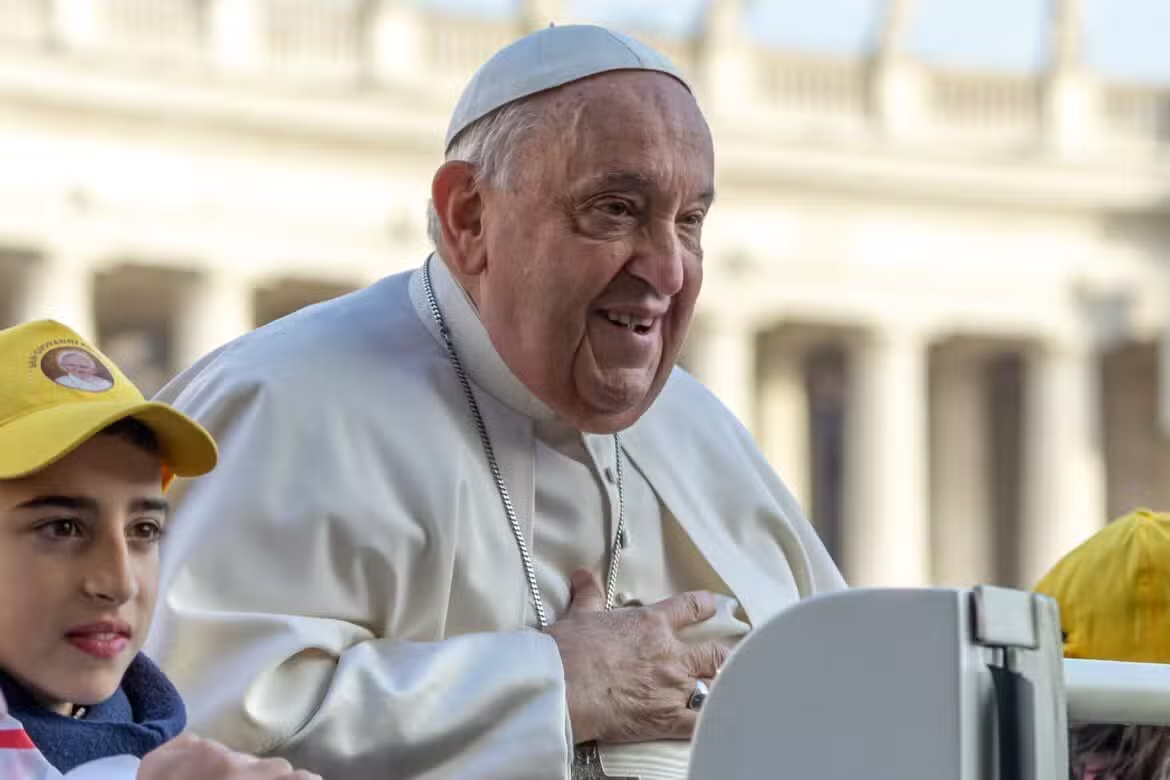Father Boniface Ramsey raised red flags about Theodore McCarrick for years before the media and Church leaders took notice. While some call him a hero, he hopes to be remembered first as a good priest.
It’s near the end of Lent 2021, the Church busy season, and Father Boniface Ramsey, 75, bounds around St. Joseph of Yorkville Parish in New York City amid a hectic schedule.
On this warm, early spring day as the city seemingly emerges, slowly and cautiously, from a yearlong pandemic, students at the parish school are playing on the street. The neighborhood, with its tidy Upper East Side brownstones and apartments, looks as if it could be placed on a Hollywood back lot representing old New York.
Father Ramsey has just returned from bedside prayer with a dying parishioner. There will soon be weekday Mass at noon, with a few dozen congregants reflecting on the final days of Jesus’ life and the prophetic Book of Jeremiah.
“I love being a priest,” says Father Ramsey during a lull in the day’s activity. “The sacraments mean everything for me.”
Ordained a Dominican priest in 1973, Father Ramsey was once a seminary professor and scholar with a focus on patristics, early Christian art, and history. Besides German, he is fluent in French. In 2004, he became a priest of the Archdiocese of New York, his hometown. Father Ramsey’s career reflects a record of accomplishment as a scholar and urban pastor. But when the time comes to write his obituary, he realizes that little of that will matter. He is sure to share the first sentence with the scandal-scarred former Cardinal Theodore McCarrick. They remain inextricably linked.
For decades, Father Ramsey knew much about McCarrick’s sexual misconduct but found few willing to listen and fewer still willing to do anything about it.
“It would come up on occasion,” Father Ramsey recalls, particularly when McCarrick was up for an ecclesial promotion or was the subject of a laudatory story. “Something would irritate me on all this. I would feel frustrated and not listened to.”
McCarrick’s story has been told in numerous media outlets, as well as in the landmark official Church report on him issued in 2020. Coupled with the Pennsylvania grand jury report detailing decades of priest sex abuse, the events disheartened and dismayed Catholics.
The Beach House
But it was nothing new for many in McCarrick’s circle. Father Ramsey knew about the harassment McCarrick directed toward students at Immaculate Conception Seminary in South Orange, New Jersey. From 1987 to 1996, their paths crossed, at a time when McCarrick was archbishop of Newark and Father Ramsey was a professor at the seminary.
It begins with the beach house. McCarrick—their superior, who would ultimately decide their path to ordination—would arrange for seminarians to join him at the Jersey Shore for what was billed as a respite of rest, recreation, and contemplation. The invitees would always exceed the number of beds available, so McCarrick would share a bed with one of the seminarians. It was an open secret among the staff and students at the seminary at the time. He asked his favorites to refer to him as “Uncle Ted.”
That was not all. When Father Ramsey argued against advancing a seminarian personally recruited by McCarrick—a former flight attendant whom the then-
archbishop had befriended on his many travels—he was taken off the committee that made such decisions.
Father Ramsey tried to get the word out about what was happening at the seminary. Few wanted to hear, he says. He spoke to a fellow Dominican, the late Archbishop Thomas Kelly of Louisville, around 1993. Father Ramsey says that Archbishop Kelly indicated that many of his fellow bishops knew of McCarrick’s behavior.
After the funeral of New York Cardinal Edward Egan in 2015, at which McCarrick was an honored guest, Father Ramsey wrote to Cardinal Se√°n O’Malley of Boston, the prelate in charge of the Catholic Church’s sex abuse response. That letter remained unanswered.
Cardinal O’Malley, after the scandal broke, blamed an administrative error that resulted in his not seeing the letter. He later apologized. In a statement posted to the Boston Archdiocese’s website, Cardinal O’Malley wrote, “I apologize to Father Ramsey for not having responded to him in an appropriate way and appreciate the effort that he undertook in seeking to bring his concerns about Archbishop McCarrick’s behavior to my attention.”
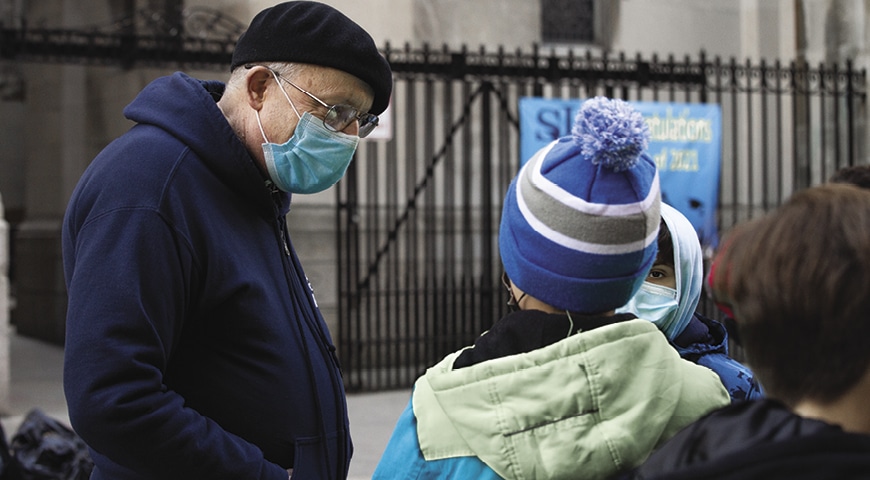
Father Boniface Ramsey chats with students at his alma mater, St. Joseph School, located in Yorkville, a neighborhood in New York City’s Upper East Side.
Photo: Dennis Livesy
Frustrated by inaction by Church officials, Father Ramsey tried to attract media attention. In an email to a journalist in 2006, he wrote that McCarrick had a “history of Michael Jackson-like behavior with his seminarians when he was archbishop of Newark.”
Six years earlier, Father Ramsey had written to Archbishop Gabriel Montalvo, then papal nuncio, just as McCarrick was being mentioned as a prime candidate to become the new archbishop of Washington, DC. It was a position he eventually secured.
The Quiet Hero
At the time, McCarrick’s behavior was known to be directed solely toward other adult males. Father Ramsey had not heard of any minors being physically abused. But when the Archdiocese of New York in 2018 revealed that McCarrick had been credibly accused of abusing a boy while he was a young priest, Father Ramsey’s suspicions found a wider audience. The priest’s name became linked to stories about McCarrick, and he was credited as a whistleblower, finally getting heard.
“There really wasn’t much courage involved,” says Father Ramsey, noting that his involvement created frustration but little personal risk. At the time, he was a Dominican Order priest, outside the direct purview of McCarrick’s authority.
While the McCarrick revelations created an uproar, some blame those who looked the other way. Father Ramsey is not among them. “They were good people who were horribly flummoxed about this. They just didn’t know what to do about it,” he says.
Those who work in advocacy for victims of sex abuse credit Father Ramsey for his persistence and truth-telling.
“Ramsey is a hero,” says Robert Hoatson, a former Newark seminarian, priest, and student of Father Ramsey’s, who is now a layman and founder of Road to Recovery, an organization that assists sex abuse victims. Father Ramsey, says Hoatson, provided a quiet, often unrecognized witness to the truth.
“I had no indication at the time that he was working in the background to protect the seminarians,” recalls Hoatson. He describes how seminarians at the time were aware of McCarrick’s beach house activities, with an atmo-sphere of fear and secrecy covering up the behavior. While others remained mum, Father Ramsey spoke up, says Hoatson, because “he believed that the priesthood was sacred and holy and should not be tarnished.”
Terry McKiernan, president of BishopAccountability.org, which compiles information on the sex abuse crisis in the Church, says that Father Ramsey played an admirable role in the McCarrick case.
The priest was “an insider willing to take some risks to address the situation that he thought was wrong.” He also acted amid the constraints felt by Church whistleblowers, says McKiernan. Much of what Ramsey described later surfaced in charges raised by former apostolic nuncio Archbishop Carlo Maria Vigan√≤, who in 2018 issued a jeremiad accusing Pope Francis of ignoring McCarrick’s abuse.
McKiernan notes that Father Ramsey was careful to distance himself from the most inflammatory and unproved accusations issued by the former nuncio. In an atmosphere where some have blamed homosexuals for the Church sex abuse crisis, Father Ramsey says he is respectful of the struggles of gay clergy and seminarians and thinks they should not be targeted simply because they are gay.
Donna Doucette, executive director of Voice of the Faithful, formed in response to the sex abuse crisis that emerged in Boston early this century, credited Father Ramsey for persistently working through a system that didn’t want to hear what he had to say. “There were bishops who looked the other way because it would cause them trouble,” she says.
While its effects still linger, the McCarrick sex abuse scandal is no longer front-page news—with Father Ramsey and others grappling with its long-term impact.
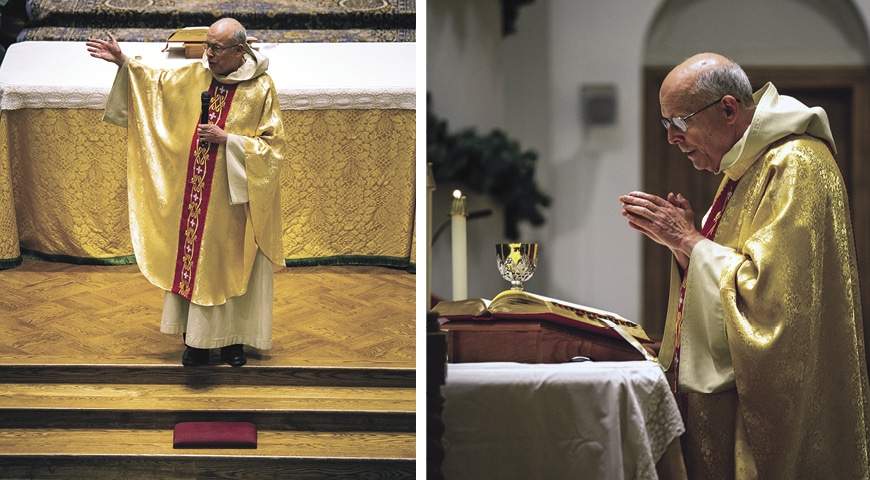
Father Boniface Ramsey preaches at St. Joseph Parish in Yorkville. Photos: Dennis Livesy
A Parish Priest
As a result of the scandals, bishops have taken a hit in public credibility, Father Ramsey says. Still, after more than a dozen years at St. Joseph Parish, he realizes that Catholics generally still admire their parish priests, who are the closest to them and whose strengths and human weaknesses are regularly on display. He says there are parishioners who love him and those who don’t, a situation that remains as it has always been.
Still there are other things he would like to be remembered for beyond his ongoing confrontation with McCarrick. Father Ramsey fought unsuccessfully for the restoration of a facade of an old orphanage, formerly run by the parish, now owned by a posh private school. A headline in the New York Times described it as a case of “The Private School v. the Radical Priest.”
The facade was plastered over, but Father Ramsey was able to negotiate a scholarship in memory of the orphans. “I won as good as I could have won under the circumstances,” he says.
Father Ramsey also preached against drug dealers in the parish. One of them responded by sending the priest a threatening letter. He says the open drug scene in the parish has largely faded.
Still he realizes he will not be remembered in the public realm for those struggles, or for his work as a patristic scholar and author of books and articles on the Fathers of the Church. He will remain forever linked to McCarrick, now living in quiet exile, laicized and no longer a cardinal.
Despite the apathy and sometimes outright opposition from Church higher-ups, Father Ramsey says his faith never wavered during his time as a seemingly lone whistleblower. “The story was frustration,” he recalls. “No one seemed to care about what seemed so obvious to me.”
He remains no biblical Jeremiah, castigating the authorities for their failures. Father Ramsey says they all had reasons for acting, and not acting, the way they did. Father Ramsey has navigated the transition from being a Dominican priest, with its strong sense of community and a superior who is elected by and lives with other priests, and that of an archdiocesan priest who, for the most part, lives alone.
He describes himself as enjoying the autonomy. He asked to extend his ministry beyond the usual 75-year-old retirement age, keeps reading regularly, and takes long walks, sometimes as much as 10 miles back and forth to Brooklyn, to dine with priest friends. He remains lanky and slim.
“God gave me a certain ease,” Father Ramsey says, leaning back in his chair in a rectory meeting room. He remains convinced that despite its all-too-human blemishes, the Church “is the bride of Christ. I truly believe that. I love the Church.”
BishopAccountability.org: A ‘Digital Archive’ of the Clergy Abuse Crisis
While the sex abuse scandals surrounding Theodore McCarrick and the Pennsylvania grand jury report have faded from the headlines, one organization works daily to prevent future cover-ups.
BishopAccountability.org describes itself as “a digital and brick-and-mortar archive of the Catholic clergy abuse crisis.” The organization tracks assignment histories of accused clergy and religious, maintains a database of accused, and tracks the lists of accused that the dioceses and religious orders have published.
The organization’s mission is to hold bishops accountable for abuse that occurs under their watch.
“It is a matter of public record that US bishops have knowingly transferred thousands of abusive priests into unsuspecting parishes and dioceses, placing fear of scandal’ ahead of the welfare of children,” according to BishopAccountability.org. “The bishops themselves have apologized for what they call their mistake,’ but they say nothing about the crucial actions that constitute accountability.
“For accountability to occur, two things must happen: 1) There must be a full account’ of the bishops’ responsibility for the sexual abuse crisis, both individually and collectively, and 2) bishops who have caused the abuse of children and vulnerable adults must be held accountable.'”
BishopAccountability.org “makes publicly available more than 63,630 pages of Church files; over 121,000 news articles; a collection of investigative and other reports and studies totaling more than 100,000 pages; and over 1,880 archived copies of lists of accused, created by more than 150 dioceses and more than 25 religious institutes and provinces.”
The website also includes an “abuse tracker” with links to media reports of clergy sex abuse coverage.


